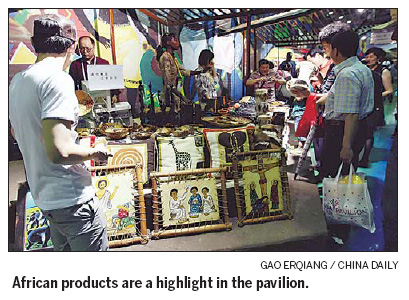Plenty of bargains out of Africa

Crowded around the small stalls of the Africa Joint Pavilion, shoppers chatter, asking "How much is it?" and "What is this made of?" eager to find out more about the various African imported products.
"The Africa Joint Pavilion has been very popular since opening," said Li Xiaoxiao, the pavilion spokeswoman. The average daily number of visitors to the Expo 2010 Shanghai hit 300,000 in mid May and since then the pavilion "has seen 60,000 to 70,000 visitors a day", Li said.
African products are a highlight in the pavilion with more than 38 stalls from different African countries. Thousands of products were transported to the Expo 2010 Shanghai.
"I've only heard about Uganda from my textbook," said Guo Huaifeng, a 34-year-old computer engineer, who spent 140 yuan at the Uganda stall for two hats made of bark. "Those are very special, and the prices are reasonable."
While most products these days are mass produced, hand-made products are becoming highly valued.
"The wooden jewelry boxes sold very well," said Jameson, owner of the Kenya stall. "Ladies are crazy about them."
Women may be more known for shopping, but some men at the Expo are splurging for certain interesting items.
"These are made of camel's bone," said Li Zhenpeng, who bought two key rings as soon as he was told of the raw material. "These are very special."
Apart from elegant hand-made products, famous Kenyan coffee is also available for 100 yuan per 500-gram bag.
A colorful chameleon made of coconut leaves at the Madagascar stall is a must-see item. With its shinny color and freaky shape, it has attracted a lot of attention from visitors.
"My nephew will love this," said Zhang Jingfang, 42, from Shanxi. Her nephew asked her to buy him a special gift from the Expo. "I have gone to many stores, but couldn't find anything he would like."
Unusual products, such as sliced fossils and shell fossils, are also attracting buyers.
Walking around the collection of African goods, more mysterious items wait to be discovered - elegant perfume bottles with gilt edge at the Republic of Djibouti stall, an expensive handbag made of chamois leather at the Somali stall and fresh coffee at the Ethiopia stall.
"Selling products at high prices is not our objective," said an Eritrean seller with Chinese name Lu Ai. "We would like to share our culture and lifestyles with everyone."
Africa isn't the only one with special items for sale. Across the river in the Puxi section, there are some enticing items in the Japanese Corporate Pavilion. Thanks to the popularity of Japanese animation, many visitors made a special trip to see Studio Ghibl, where products of My Neighbor Totoro, a famous animation movie by Hayao Miyazaki, are sold.
"Those cute figurines are my best memories of childhood," said Wang Ming, 28, a woman who works in a law firm. "I have to buy one."
Wang is not the only adult crazy about the shop, a lot of people in their 20s or early 30s come here to relive their younger years.
Miki House, a famous Japanese children's clothing line, is also in the pavilion. It not only offers premium designs but also premium prices. Sparkling clothes in Miki House catch visitors' attention. A T-shirt and pants embroidered with 6,500 crystal stones cost 11,000 yuan.
"Even in Japan, our products are very expensive," said Yang Mei, the manager of Miki House in the Expo Garden. "Add taxes and prices are even higher in China."
Yang said that they sold more than 20 T-shirts priced at 1,500 yuan each by the end of May and more than 60 pairs of shoes that cost 750 yuan.
 0
0 







Go to Forum >>0 Comments